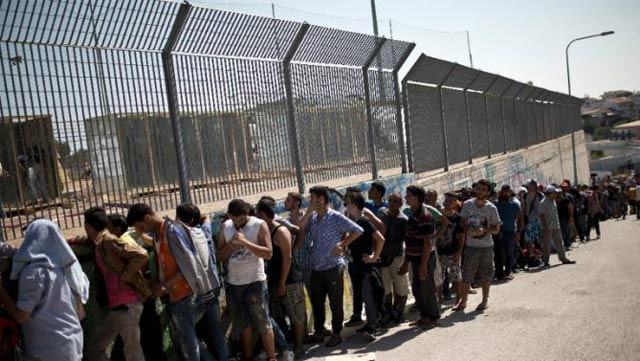Greece denies it faces Schengen suspension over migrants
Question of Greece withdrawing from the Schengen accords has never been posed at an EU level, govt spokesperson said

Question of Greece withdrawing from the Schengen accords has never been posed at an EU level, govt spokesperson said. PHOTO: AFP
The Financial Times had reported that several European ministers and senior EU officials believe threatening suspension from the Schengen zone could persuade Greek Prime Minister Alexis Tsipras to "deliver on his promises and take up EU offers of help".
Greek police arrest 10 over forged papers for migrants
"The FT report contains falsehoods and distortions," junior interior minister for migration Yiannis Mouzalas told reporters.
He added that certain EU countries were "falsely" accusing Athens over shortcomings shared by the bloc as a whole, such as delays in repatriating economic migrants.
Mouzalas said the FT report reflected "commonly used" criticisms against Greece "by these member states", without naming the states.
Eleven migrants, including six children, drown off Greece: coastguard
Hungary and Slovakia have recently criticised Greece for failing to adequately protect the EU's southeastern border.
Mouzalas denied that Greece has resisted taking 300 European migrant registration machines as suggested by the FT report, noting that Athens asked for 100 of them. He also denied that Greece had taken insufficient steps to repatriate migrants.
"We have organised returns to Pakistan that were not accepted, and we are trying to organise returns to Turkey that are also not accepted," Mouzalas said.
The FT said Athens also had reservations about allowing European patrols on its border with its northern neighbour Macedonia.
Serbia shuts borders for Pakistani migrants
French daily Le Monde on Wednesday echoed that Greece risks exiting the Schengen zone, reporting that EU Commission chief Jean-Claude Juncker had warned Greek Prime Minister Alexis Tsipras of the possibility.
Pressure on Greece to step up border vigilance amid an unprecedented influx of refugees and migrants to Europe this year has increased after the November 13 militant attacks in Paris.
At least two of the Paris attackers were confirmed to have passed registration on the Greek island of Leros in October, posing as refugees.
Greek authorities insist that in the absence of forewarning from other European agencies, it is almost impossible to detect whether extremists are hidden among the refugee influx.
Balkan border controls leave migrants in limbo: aid agencies
European Council President Donald Tusk said in an interview published Wednesday that refugees should be screened for 18 months before being let into Europe, arguing that it is currently "too easy" for them to enter.
"Please don't downplay the role of security. If you want to screen migrants and refugees, you need more time than only one minute to fingerprint," Tusk said in an interview with Britain's Guardian and five other European newspapers.
The International Organization for Migration estimated in late November that nearly 860,000 migrants had landed in Europe so far this year, with over 3,500 dying while crossing the Mediterranean in search of safety.
Athens also notes that most of the Paris attackers, who were French and Belgian nationals, were also able to evade detection elsewhere in Europe.
Migrants storm Budapest train as horror of crisis hits home
Greek government spokesperson Olga Gerovassili stressed that "the question of Greece withdrawing from the Schengen accords has never been posed" at an EU level.
"Greece has fulfilled its European obligations, despite the great difficulties involved," she insisted, adding that this had been "clearly recognised" on the margins of an EU-Turkey summit on Sunday.
Several European sources in Brussels also denied that Athens had received any Schengen threats from the EU institutions, while admitting that some capitals were less than happy.
One diplomatic source said "these are ideas circulating in the Brussels corridors," like the recent warning from Eurogroup chief Jeroen Dijsselbloem that a small group of EU countries may be forced to form a "mini-Schengen" if the bloc fails to resolve its migrant crisis.
30,000 migrants now on Greek islands, 20,000 on Lesbos: UN
"But we aren't there yet," the source added, while admitting that "there is growing impatience with Greece among some member states".
Meanwhile Slovakia said Wednesday it had mounted a legal challenge to the EU's plan to distribute 160,000 asylum-seekers among member states under a quota system.
"The Slovak republic has officially filed a lawsuit against the Council of the European Union, to the highest court ... in Luxembourg," leftist Prime Minister Robert Fico said.
He added that the suit challenges "so-called mandatory quotas" on refugee re-location, which EU interior ministers adopted in September amid fierce opposition from central and eastern European member states.
Under the EU's quota system, Bratislava is expected to take in just under 2,300 migrants.
Fico slammed the quota programme as a "total fiasco" and said "we have to find another way" of dealing with the EU's migrant inflow.



















COMMENTS
Comments are moderated and generally will be posted if they are on-topic and not abusive.
For more information, please see our Comments FAQ